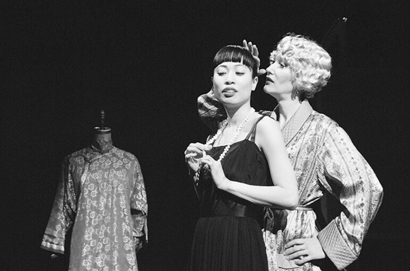Pan Asian biographical play misses its mark on Anna May Wong
Hers was one of the most iconic looks in film history, while she, herself, uncannily remains the most instantly recognizable emblem of Asian womanhood. Was it those patent leather bangs perfectly framing that exotic face—get back, Louise Brooks!—her sinuous, ultra-feminine grace, or merely that euphonious name?
Whatever the reason, Anna May Wong (1905-61) continues to fascinate, with a slew of biographies and film revivals—the most recent being last year’s Piccadilly (1929), in which she had a rare starring role. Despite this, so little is really known about her. Elizabeth Wong’s play, “China Doll,” endeavors to make this ultimate symbol of Oriental inscrutability more knowable.
That the play fails so utterly is a real shame, as this potentially great subject would seem such fertile ground for an investigation of celebrity and, specifically, how racism entered into the picture. Wong takes her lead character, played by Rosanne Ma, from her humble Los Angeles beginnings as a laundryman’s daughter to her modest success in Hollywood, greater achievement in Europe, major career disappointment and eventual, solitary, alcoholic existence before her death, from a heart attack, at age 56.
Wong’s professional tragedy stemmed from her never being allowed to be cast as a Hollywood romantic lead and, in those racist times, breaking the rules by kissing a white actor. The last straw for her was when she was passed over for both leading roles in Irving Thalberg’s film rendering of Pearl Buck’s novel, “The Good Earth,” roles that were given to two Viennese actresses, Luise Rainer and Tilly Losch.
Movie star biography, especially when rendered for the stage, is always tricky to pull off. Indeed, the last successful attempt in memory was Claudia Shear’s seductive, clever Mae West pastiche, “Dirty Blonde.” Shear managed, via the use of vital, ancillary characters, to find a clever way into West’s story, thereby maintaining an essential, audience-involving sense of discovery, as well as fully serving the incandescent mystery and all-potent allure of her subject.
Elizabeth Wong’s approach is a flat-footed use of flashbacks from the “present” time of Anna May’s reduced status as the landlady to a callow youth (Robert Wedig) to events from her past. Her dialogue—with Anna May often directly addressing the audience—is stilted, her exposition clumsy and her idea of this star a one-note portrait of a thwarted, but forever glossy-and-gleaming-on-the-surface victim of sketchy circumstance. The fact that the Anna May had a drinking problem in later years is one of the few definitive things known about her. In the play, she is often seen waving an empty martini glass about, but, except for a pretty crying jag or two, the real toll of addiction is never revealed.
Inaccuracies also abound in the script, as when Anna May expresses a wish to go “dancing at the Garden of Allah,” which was, in actuality, actress Alla Nazimova’s home and apartment complex, which she also rented out. When she’s cast in her most famous film, Josef von Sternberg’s magical “Shanghai Express,” Wong wonders what its star, Marlene Dietrich, will be like. The two had actually met in Berlin, three years earlier, as a famous, era-defining Alfred Eisenstadt photo of the two of them at a party, with Leni Riefenstahl, no less, proves.
Wong is seen, agonizingly rehearsing a line from “Shanghai Express.” In that film, the real Anna May stole every scene she was in, via a mesmerizing, deadpan smolder, which even outdid the formidable deadpan smolder of Marlene Dietrich. When, while playing solitaire, she subtly dismisses the puritanical protestations of a tiresome old biddy, in perfect English rather than the expected singsong pidgin—“I’m not sure if I meet the standards of respectability required by your boarding house, Mrs… Haggerty”—it is, for many Asians, a bracing “fuck you,” on a par with Sidney Poitier’s slapping the crap out of bigots in “In the Heat of the Night.” In the play, writer Wong has her actress repeat the line over and over again but, surely, its singular, dead-shot delivery was coached by von Sternberg, a master of hypnotic linguistic nuance.
Famous people traipse through the show—Wong’s dashing “Thief of Bagdad” star, Douglas Fairbanks (an apt Jamie Cummings); boy genius producer Thalberg, who passed her over and had a heart problem (as if on cue, the multi-part-playing Wedig clutches his chest); and Dietrich, herself, played by Sandy York as a Teutonic Mother Teresa, in the playwright’s misconception of the diva as essential helpmate to Anna May. In reality, Dietrich felt threatened by Wong’s strength in their film.
More’s the pity because Ma is physically perfectly suited to play the role, possessing the grace and innate elegance of Anna May and a similar cultivated-yet-other voice. But as written, and humorlessly directed by Tisa Chang, Ma performs monotonously, on a single too-declamatory, slightly superior note, regardless of whatever harrowing circumstances. On the plus side, Ruth Zhang has a total, winning authenticity as her earthy, supportive mother.
Especially in this case, Pan Asian Repertory Theatre absolutely needs to give its productions some real sets in its somewhat tricky location at the Church of St. Paul and St. Andrew. An empty, gloomy stage with the barest suggestion of background, and the actors forced to mime their business with non-existent props, like dollar bills, place too great a strain on taxed performers. The name “Anna May Wong,” itself, conjures up worlds of luxury and glamour and a lost sophistication; this production is a fleshless skeleton.
gaycitynews.com



































